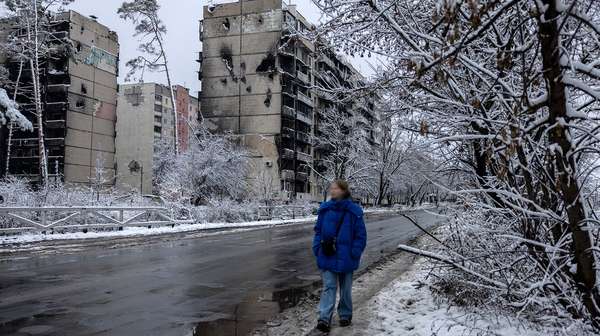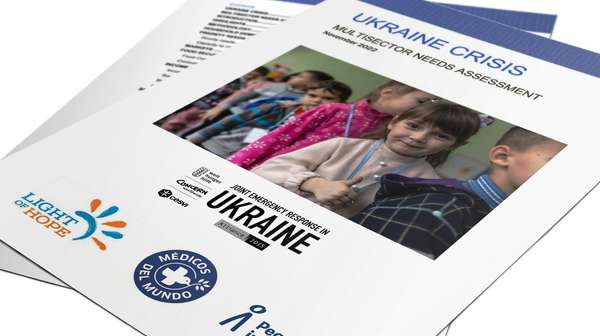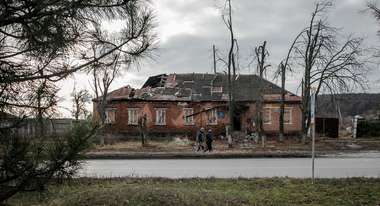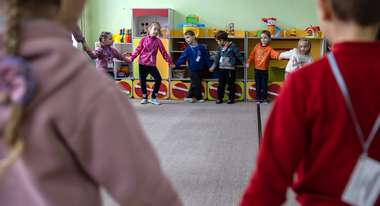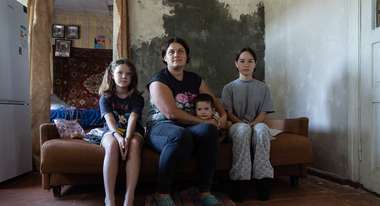In response to the war in Ukraine, our Alliance2015 alliance partners are supporting refugees with everything that is currently needed.
Ukraine: NGOs call for protection, access, localisation and durable solutions
A joint statement by members of the Ukraine NGO Advocacy Working Group (AWG).
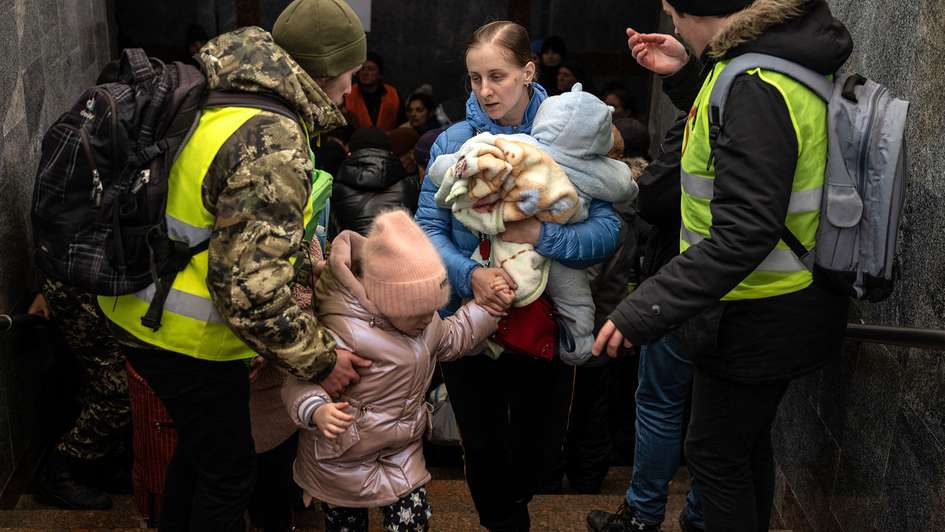
The lives of nearly 44 million people in Ukraine have been impacted since the escalation of the war one year ago. Nearly 18 million men and women, boys and girls are in need of urgent humanitarian assistance within Ukraine, including the 6 million internally displaced, and a further 8 million have been forced to flee into neighbouring countries.
Ahead of the one-year mark of the escalation of the international armed conflict, the undersigned members of the Ukraine Advocacy Working Group* call on the international community to urgently prioritise: the protection of civilians; humanitarian access to hard to reach communities in need; localisation and durable solutions.
*The Ukraine NGO Advocacy Working Group (AWG) is an informal advocacy coordination group of over 50 international and national organisations operating in Ukraine and engaged in the humanitarian response.
Protection of Civilians
This intensification of hostilities over the last 12 months, including the use of explosive weapons and legally banned weapons, such as antipersonnel landmines and cluster munitions, has resulted in widespread civilian casualties. The near-daily missile attacks have repeatedly affected civilians and civilian infrastructure including water, electricity and gas supply systems, as well as communication infrastructure. These attacks are having multi-layered impacts on women, men and children. They affect people’s safety and their physical and mental health, they harm livelihoods, and compromise access to healthcare and education.
Women and girls of diverse, intersecting identities continue to face extremely high risks of gender-based violence (GBV), including domestic violence and sexual exploitation and lack essential services, including for sexual and reproductive health. Girls and boys continue to witness atrocities, and many suffer from long-term physical and psychological injuries. There are widespread reports of grave human rights violations including torture and conflict-related sexual violence (CRSV) in areas of active fighting close to the front line. People remaining close to the frontlines are disproportionately older persons and people with disabilities, with specific needs and who experience barriers to access services, evacuations or IDP shelters. Persons at risk of discrimination, including LGBTQI+ individuals, Roma and Third Country Nationals are also experiencing challenges in accessing humanitarian assistance in an equitable or dignified manner.
Humanitarian Access
Despite growing humanitarian needs, particularly in eastern and southern Ukraine, humanitarian access to Russian-controlled territories continues to be denied and it is near impossible for aid workers to reach the communities most in need. Some areas have not received any assistance from aid organisations in Ukraine since February of last year. Aid currently flowing across the contact line is often carried in small quantities and at significant personal risk to volunteers and other community workers. Over 4 million people live in areas with high to extremely high access constraints, with the highest severity of needs among people living in Russian controlled areas or in areas directly affected by active hostilities. None of the inter-agency humanitarian convoys have been able to cross between Ukraine and Russian controlled areas, despite repeated attempts and negotiations. Only three out of sixteen humanitarian convoy attempts to evacuate civilians from Mariupil and Zaporizka oblast have been successful.
There is no freedom of movement for civilians between areas under Ukrainian control and those controlled by Russia, including to seek safety or to be reunited with family. In areas no longer experiencing active hostilities, widespread mine contamination is preventing safe return, recovery and the delivery of aid. Regular, unfettered humanitarian access, including through safe routes when necessary, must be ensured to allow free movement of civilians, aid workers and relief items. Humanitarian organisations are calling for the international community to conduct urgent and targeted advocacy on humanitarian access at the most senior levels and as a standalone priority.
The humanitarian situation in Ukraine remains dire with few signs of improvement as war continues in the eastern and southern regions of the country.
Localisation
Local and national organisations, including women’s organisations and those working with marginalised groups, were the first responders when the war escalated. They remain the primary providers of humanitarian aid in Ukraine today, particularly in the Russian controlled areas and other high-risk areas. Yet, they remain severely under-resourced. Resources are still centralised by a handful of international actors, and the humanitarian system is struggling to effectively localise the response. Inconsistent provision for multilingual communication also undermines the meaningful participation of local and national organisations.
Furthermore, the available funding is usually short-term, with heavy and time-consuming compliance, reporting and due diligence requirements. Beyond the financial support, local civil society organisations and affected communities must be supported to participate in all decisionmaking spaces relating to the ongoing humanitarian response, as well as in eventual recovery and reconstruction efforts. Concerted efforts are needed to genuinely progress on international commitments to localisation.
Durable solutions
Nearly 6 million people are internally displaced across Ukraine, with shifting frontlines regularly causing new displacements. Those IDPs still residing in collective centres are among the most vulnerable: 64 percent of them are women, 25 percent children, 17 percent older people and 15 percent people with disabilities. These collective shelters lack adequate living conditions and do not meet basic protection standards, including for GBV risk mitigation, increasing the chances of women and girls’ exposure to harm and abuse. IDPs across Ukraine need access to protection, including mental health and psychological support services and GBV services, social support, legal aid and cash assistance.
Durable solutions for displaced need to be at the heart of humanitarian response, recovery and reconstruction planning for the country. Only a small number of local governments have adopted programs to provide temporary or permanent housing for IDPs,3 while the vast majority of displaced live in compact settlements and in private households with friends and acquaintances. Without comprehensive durable solutions and accommodation strategies, linked to the nation-wide recovery and reconstruction plans, IDPs and refugees may end up displaced for a protracted period of time. Across Europe, where nearly 8 million refugees from Ukraine have sought protection, it is equally vital to ensure continued reception support and expanded inclusion and early integration measures for refugees, including access to education, healthcare and social services, labour market and housing. Displaced families within and outside of Ukraine, as well as conflict-affected communities across the country, need long-term support to overcome trauma, cash assistance to meet their basic needs, and strategies to increase their resilience.
We are calling on all relevant stakeholders to prioritise the following:
- Urge for International Humanitarian Law to be fully upheld with due consideration to the principles of humanity, necessity, proportionality, and distinction. All attacks against civilians and civilian infrastructure, including schools and hospitals, should be systematically condemned and responsible individuals held accountable.
- Commit to fully fund the 2023 Humanitarian Response Plan, and Regional Refugee Response Plan (RRRP). Ensure that all interventions (in response plans and beyond) are informed by the views of all affected people, including consulting women, children and marginalised groups on their specific needs and priorities.
- Ensure that all interventions (in response plans and beyond) are informed by intersectional gender analysis and sex, age, race, ethnic background and disability disaggregated data.
- Urgently reinforce dialogue on humanitarian access to conflict-affected areas and ensure that people can access humanitarian aid wherever they are.
- Scale up direct, flexible and unrestricted funding for national and local organisations. Foster the development of new pooled funds and consortia modalities for smaller and newer humanitarian NGOs and voluntary networks to allow for WROs/WLOs, LGBTQIA+, and youth-led organisations working with marginalised groups to access funding. In coordination with intermediaries, UN agencies and INGOs, harmonise and simplify reporting procedures, due diligence and compliance processes.
- Ensure meaningful consultation and participation of Ukrainian civil society organisations, including WROs/WLOs, LGBTQIA+, and young people-led organisations working with marginalised groups and affected communities in all decision-making spaces and dialogue to develop approaches to localisation, including provision for multilingual communication.
- Double-down efforts to protect and support refugees from Ukraine by helping them meet their basic needs, providing them with reception, inclusion, and early integration support to ensure people can make voluntary and informed decisions about their future.
- Scale up humanitarian, recovery, and reconstruction efforts, as well as coordination between aid organisations and local service providers to ensure durable solutions for displaced individuals and families, both inside Ukraine and abroad. Meaningful participation of IDPs, including older women and men, in the development of solutions and the decision-making on housing, employment and other needs on the local and national level must be at the heart of these processes. Consultations should be extended to those displaced in host countries.
Signatories
- ActionAid
- Arbeiter-Samariter-Bund
- CLEAR Global
- Cherkasy Human Rights Center
- Christian Aid
- Danish Refugee Council
- Handicap International
- HelpAge International
- Helping to Leave
- International Rescue Committee
- INTERSOS
- Medicins du Monde International Network
- Mercy Corps
- Norwegian People’s Aid
- Norwegian Refugee Council
- Oxfam
- People in Need
- Plan International
- Polish Humanitarian Action
- Premiere Urgence Internationale
- Right to Protection
- Save the Children
- Solidarités International
- Stabilization Support Services
- Terre des Hommes
- War Child
- Welthungerhilfe
- World Vision
WHH is one of the largest private aid organizations in Germany and enjoys both political and religious independence. It is fighting for “Zero Hunger by 2030”. Since being founded in 1962, it has provided funding of EUR 4.46 billion for more than 10,895 overseas projects in 70 countries. WHH bases its efforts on the principle of empowering people to help themselves, which it implements with measures ranging from rapid disaster relief to rehabilitation to long-term development cooperation projects with national and international partner organizations.





